Revisiting Linux Part 1: A Look at Ubuntu 8.04
by Ryan Smith on August 26, 2009 12:00 AM EST- Posted in
- Linux
Browser & Video Benchmarks
Next up we have our full suite of benchmarks for Firefox, along with a look at video playback performance.
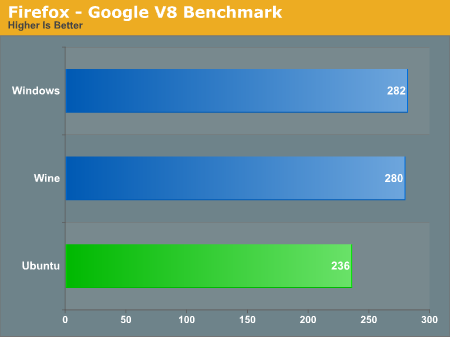
As we discussed in our look at Firefox, the Linux version of Firefox is not compiled with profile guided optimizations, and as a result it underperforms the Windows version in CPU-heavy tasks such as Google’s V8 Javascript benchmark. Running the Windows version under Wine closes this gap, however it’s a limited solution since there are other performance problems (mainly with Flash) in that configuration.
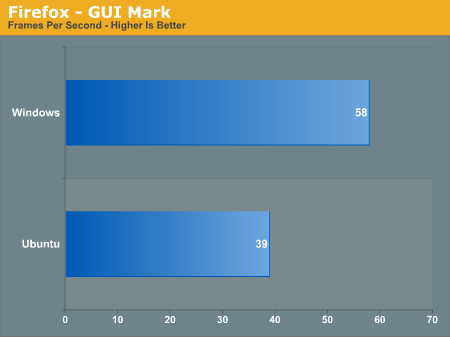
Speaking of Flash, we mentioned previously that it’s slower under Ubuntu (and virtually every other OS) than it is under Windows. This is one of the worst case scenarios, and as GUIMark is capped at 60fps it may actually be worse if we could go higher.
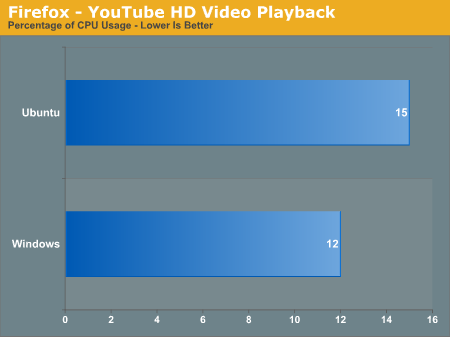
For another look, here’s the CPU usage of Firefox while watching an HD YouTube video. Ubuntu once again underperforms compared to Windows, but not by nearly as much as the worst-case scenario.
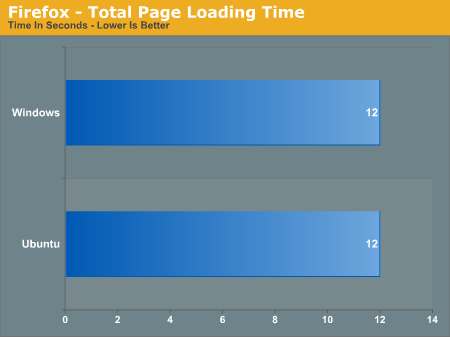
In our page loading tests however, this difference melts away. The total loading time of our 4 pages is 12 seconds under both Ubuntu and Vista.
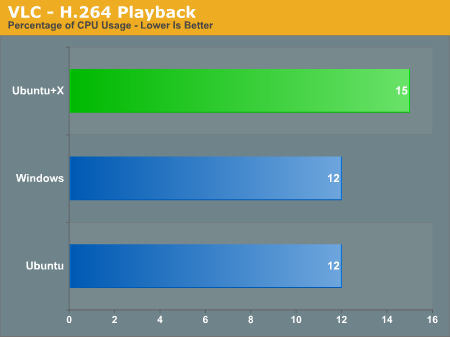
Finally we have VLC as our Linux video playback benchmark. While VLC is not the default media player for Ubuntu, we’re using it instead of Tote due to the fact that it’s cross-platform. Here we’re taking a look at a 30 second section of a 720P H.264 encoded movie.
There’s an interesting phenomena here with respect to CPU usage. VLC uses roughly the same amount of CPU time on both operating systems, however we caught Ubuntu’s X server eating up additional CPU time on Ubuntu, while Windows’ Desktop Window Manager did not move. We’re not entirely sure what’s going on, but it looks like X needs to burn extra CPU time on video playback.










195 Comments
View All Comments
jasperjones - Wednesday, August 26, 2009 - link
I second most of Fox5's suggestion.1.) I've been completely ignorant of software development on Windows over the last few years. Comparison of MS Visual Studio vs Eclipse or vs Netbeans/Sun Studio? How fast are CLI C++ apps on Windows vs. Linux? Perhaps using both GNU and Intel C++ Compiler toolchains on Linux. And possibly MS Visual C++ and Intel Visual C++ on Windows.
Perhaps less esoteric, 2.) instead of benching SMB/CIFS on Windows vs Samba on *nix, bench something *nix native such as scp/sftp or nfs. Netperf.
3.) Number-crunching stuff. I guess this is sort of similar to running at least a few synthetic benches. LINPACK or some other test that uses BLAS or LAPACK, tests that use FFTW. Maybe even SPEC (I wouldn't expect any exciting results here, though, or are there?)
Eeqmcsq - Wednesday, August 26, 2009 - link
Are you looking for benchmarks in Windows vs Ubuntu with the same hardware? Or benchmarks in different CPUs/motherboards/etc with the same Ubuntu?Ryan Smith - Wednesday, August 26, 2009 - link
Cross-platform. There's no problem coming up with Linux-only benchmarks for hardware.Eeqmcsq - Wednesday, August 26, 2009 - link
I have a question about your benchmarks that involve files, such as copying and zipping. When you run your benchmarks, do you run them multiple times and then get an average? I ask that because I have learned that in Linux, files get cached into memory, so subsequent runs will appear faster. I suspect the same thing happens in Windows. Do you take that into account by clearing cached memory before each run?Ryan Smith - Wednesday, August 26, 2009 - link
We reboot between runs to avoid cache issues (and in the case of Windows, wait for it to finish filling the SuperFetch cache).fri2219 - Wednesday, August 26, 2009 - link
I heard Sony is coming out with this thing they call a Walkman.You should review that next!
StuckMojo - Wednesday, August 26, 2009 - link
ROFL!Fox5 - Wednesday, August 26, 2009 - link
The LTS is really for the same types of people that avoid grabbing the latest MS service pack. IE, anyone who's still running Windows XP SP2 with IE6. Do that comparison and see how they compare.Ubuntu is little more than a tight integration of many well-tested packages, there's no reason to go with ubuntu's LTS when everything else already goes through it's own extensive testing. Given how quickly open source software advances, I'd say the LTS is probably less stable than the most up to date versions, and certainly far behind on usability.
You want the equivalent of Ubuntu's LTS in Windows? It most closely matches the progression that the Windows server versions follow.
Ryan Smith - Wednesday, August 26, 2009 - link
To put things in perspective, 8.04 was released shortly after Vista SP1 and XP SP3 were. So Hardy vs. XP SP2 (a 4 year old SP) is a pretty poor comparison.You'll see an up to date comparison in part 2 when we look at 9.04.
awaken688 - Wednesday, August 26, 2009 - link
I'm glad you did this article. It really has been something I think about. I'm ready to read your Part II. As others have mentioned, I have a couple of other articles that would be great.1) The comparison of the various versions as mentioned. SuSe, Ubuntu 9.04, BSD, etc...
2) Someone mentioned VirtualBox. I'd love to hear more about this including a detailed setup for the normal user. I'd love to be able to surf while in Linux, but able to play games in Windows and keep them separate for added security.
Thanks for the article! Hope to see one or both of the ideas mentioned above covered.